The Michelle Ford Story, Part Two: The Plan That Sank The GDR Machine And Hate Mail On The Biggest Day Of A Swimming Life
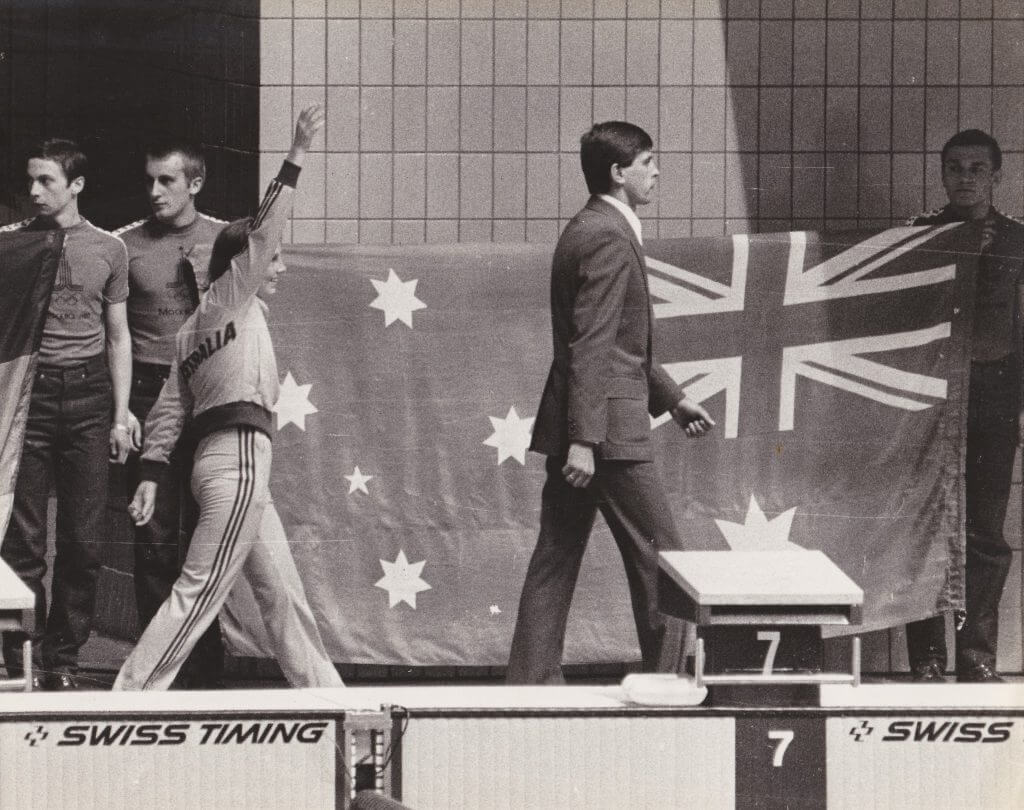
Memories of Moscow 1980 – Today marks the 40th anniversary of the fifth day of racing in the pool at the 1980 Olympic Games in Moscow, where Michelle Ford, of Australia, stopped the East German machine with victory over 800m freestyle. Here’s the second in a two-parter as Swimming World continues its 40th anniversary coverage of the events of Moscow 1980 and their impact on those who missed out and what the Moscow Games meant for those who made it, even, in some cases, when their Governments did not endorse their participation but their nations did.

Moscow 1980
Our Moscow 1980 Olympics coverage so far
- The Michelle Ford Story, Part One: The Phone Call From Her Mum That Changed Michelle’s Life Forever
- Memories of Moscow 1980: Why Rica Reinisch Had To Retire At 15 After 3 Olympic Golds & 4 World Records
- Memories of Moscow 1980: When Sweden’s Pär Arvidsson Led A Podium Of Historic Firsts Over 100m Butterfly
- Memories of Moscow 1980: 40 Years On, Mary T. Meagher Shares Memories of Olympic Boycott
- Memories of Moscow 1980: 40 Years To The Day Since Vladimir Salnikov Cracked 15-minute Barrier Over 1500m Free
- Memories Of Moscow 1980: How Duncan Goodhew Converted Olympic Gold To Victory In Life
- Memories of Moscow 1980: When Barbara Krause Took 100 Free Below 55sec 20 Years Before Her Day In Court With Kipke
- Memories of Moscow 1980 – When Sergei Fesenko Became The First Soviet Swimmer Among Men To Claim Olympic Gold
- Memories of Moscow 1980 – 40 Years Since Boycott Buried The Chances Of Cheryl Gibson & Maple Mates
- Moscow Olympic Flagbearers Max Metzker And Denise Boyd Linked Forever In Australia’s Proud Olympic History
- USOPC CEO Sarah Hirshland to 1980 Olympic Team: ‘You Deserved Better’
- The Moscow Boycott: A Toxic Mix of Sports and Politics Proved Costly for Hard-Working Athletes
An Olympic final is the pinnacle, but when you wake up on the biggest day of your sporting life to a letter from a faceless person in Australia saying “You are a traitor to this country!” it’s enough to make you cry.
But 18-year-old Michelle Ford didn’t tell a soul. She shut it out of her mind. She and her team mates chose not to discuss those distractions, those noises.
And she displayed the mental toughness of a woman who would win Olympic gold in the 800m freestyle in Moscow in 1980 in a new Olympic record time of 8:28.90 and against all the odds.
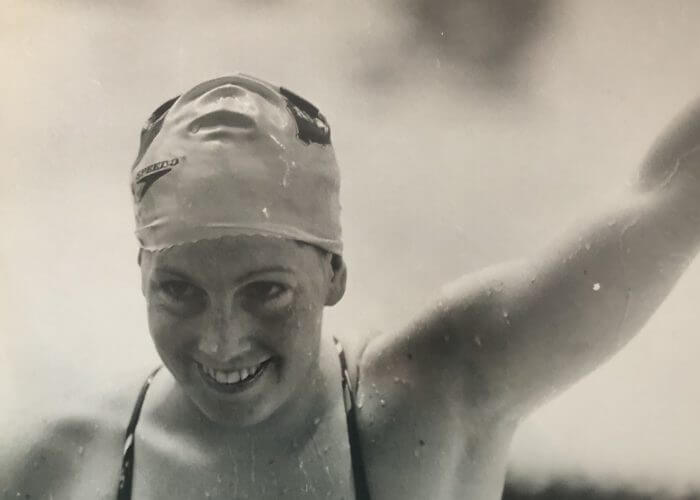
SMILE TIME: Michelle Ford greets the crowd with her winning grin. Photo Courtesy: Hanson Media Collection (Russ McPhedran).
A kid from Sydney who was born to swim and born to race – whose parents had received death threats while she trained in America, keeping them from her as she swam to keep her dream alive.
Death threats and hate mail against Australian athletes who had chosen to attend the Moscow Olympics, against the coercing Australian Government’s stance against the Russian invasion of Afghanistan.
A Government who three times forced the Australian Olympic Federation to vote on whether the team would go or not.
The nation was split – the sports were split – the athletes were split and confused – opinion polls were published every second day – sparking aggressive behavior towards our Olympians.
Ford attended an Olympic Games where the Australian Government offered our athletes $6000 (a lot of money in 1980) to stay at home and join the US, Canada, Japan and the West German boycott.
In Moscow, letters just went through to each athlete via headquarters and they passed them on.
Michelle Ford opened up on her Moscow experiences this week – on the 40th Anniversary of the Games and her remarkable gold medal swim – as she pens the final chapters of a tell all book and here she shares some of those experiences that will make your hair curl.
“Getting a letter saying If you stand up on the starting blocks you will be a traitor to your country…and just before my 800m final… it was kinda tough,” said Ford.
“I think we were all getting letters and we just decided not to talk about it any more; we chose not to give it any more importance.
“We had no staff or people to protect us or deal with those things and we were left to our own devices…”
Hate mail labeling her a traitor as she packed her Australian kitbag with her green and gold Speedos and cap.
But that wasn’t her only problem. It was the day she prepared to race three systematic East German drug cheats in her third Olympic final.
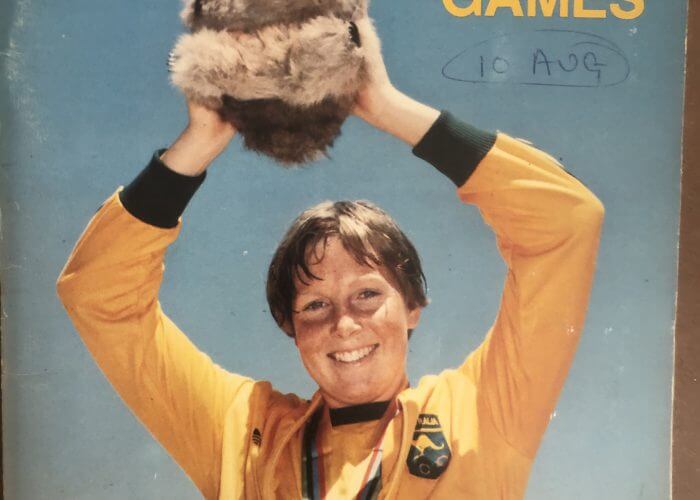
COVER GIRL: Michelle Ford as she appeared on the 1980 Moscow Olympic Games Report.
Michelle Ford had just celebrated her 18th birthday and home must have seemed light years away let alone a birthday party with jelly shots and disco dancing.
She was born tough, she survived swimming’s hard task masters in “old school” coaches Dick Caine and Don Talbot and she loved it; she thrived on it.
Bill Sweetenham added the final golden touches in Moscow with a winning strategy that caught the three-pronged East German juggernaut, by surprise.
One of only two female winners to stop the East German onslaught that won 11 of the 13 gold medals on offer – the other to Russian Lina Kachushite in the 200m breaststroke.
Ford had first confronted that juggernaut when she arrived in Montreal for the Olympics in 1976, at just 13, with her arch rival Tracey Wickham who would make the big decision to stay at home in 1980.
Montreal was a learning curve, a steep one at that, and when she got off the plane in Montreal she saw her first ever machine guns – security everywhere after the terrors of Munich in 1972. Welcome to the Olympics – a sporting event to bring together the youth of the world.
Her first Olympics where she would be confronted by a different machine, all dressed in blue tracksuits, masculine looking opponents – imposing figures who were rumoured to be on drugs.
“We were awakened to the East Germans in ’76 when we turned up and ran into them pretty much and their bodies definitely told the story right; there was (talk) around town that there was doping; I was 13 then and I didn’t understand what that all meant,” said Ford.
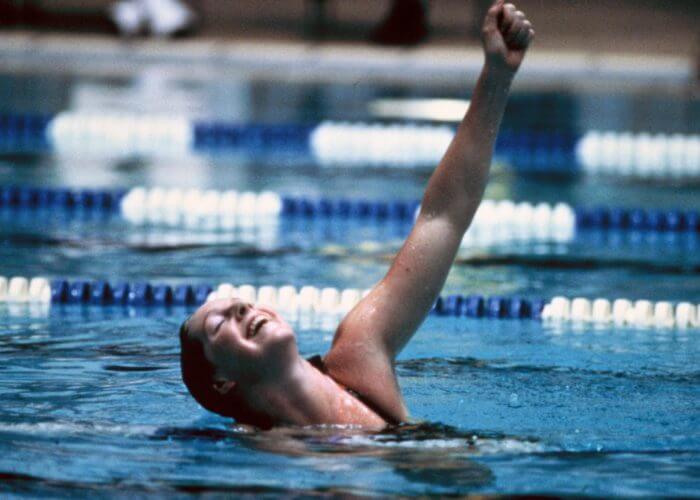
HOW SWEET IT IS: Michelle Ford realises her Olympic dream. Photo Courtesy Michelle Ford Collection.
“But for me it was cheating; to me (drug taking) is cheating..that’s the word I kept using; how do they get away with cheating?…
“They informed us in Montreal that they had tests and they would catch anyone who is cheating and you just believe that…(but then you find out) that not one East German tested positive in any of the tests.”
Ford stuck to her steak and eggs as her East German opponents were found to have bodies overflowing with so many anabolic steroids that the Stasi Files revealed later that they possessed three times the amount of the banned drug, Ben Johnson had running through his veins when caught in Seoul in 1988.
“When you had to stand on the stage with the East Germans you just had to block them out….you have to draw on your inner self and close yourself off to those noises and that’s a noise….”said Ford.
Ford had started training with Bill Sweetenham in the Sydney training camp and the pair actually clicked and it was the first time said Ford that she had swum under Sweetenham.
“We just clicked …I think he understood me and I understood him….and the combination just worked….” said Ford, who remains strong friends with Sweetenham some 40 years on.
But in Ford’s first event in Moscow, the 200 fly she got pulled out too fast with the girls in front and admitted she had never done that in her whole career.
“I never got pulled like I did against the East Germans; I guess I must have been nervous about falling too far behind and not being able to catch them.
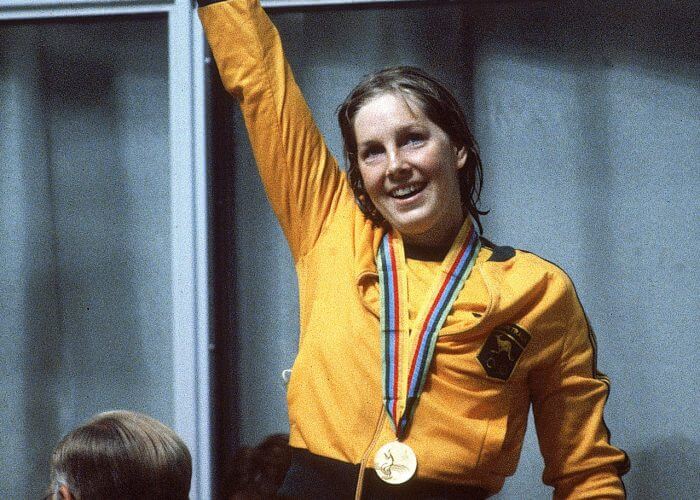
GOLDEN MOMENT: Michelle Ford on the Moscow podium.Photo Courtesy Michelle Ford Collection.
“But I went out so fast; I died in that back end and when you die in butterfly you die; coming into that wall is tough going and I was lucky to touch for that third place and I think the East Germans were mad that I even got that third placing in the 200 fly (2:11.66).
“In the 400 freestyle (4:11.65) was (on the same night) and I didn’t get a warm down; I was pulled and pushed everywhere and then off to the doping room and I didn’t get a warm down..the lactates in my body (creating havoc).
“And then to top it off I had another drug test after the heats of the 800m freestyle when I was pulled out for Doping control and I said to them ‘oh by chance I’m the one at random’….like look around you….”
“The plan in the 800 itself was to go out easy, but not as easy as I did; I would have loved to see Bill’s face after the first 100m, because I turned seventh, which was second last. I was way behind on the first 100 and I’m bot sure what Bill was thinking..he was probably concerned but I was in control.
“Then, at the 150m mark, we had decided to start moving, because they wouldn’t have expected that. So I started moving and at the 200, I was second. By the 250m mark, I’d gone through them. It was massive.
“I just wanted to put the throttle down. I had to tell myself ‘no Michelle, hold back, hold back’. I was on top of the world.
“Even the last laps, I had more, but I was so scared they were going to come back at me so I wanted something in reserve, which you should never do.
“But in that circumstance, knowing the way they were sending one swimmer up fast to set the pace, then the second one to come through, then a third… they were racing as a unit, not individuals. It was like cycling team.
“I saw that in the 200 fly and in the 800, we knew it could also be the case. You also have to understand the amount of induced muscle growth, they just sprung off those walls, they could catch anyone. They had a power in them that didn’t dissipate.
“So with all of that in my mind, I thought I had to be ready for that challenge and hold something back.
“It probably cost me a couple of seconds in time but I was (out) to win. You do what you need to do to win at an Olympic Games.”
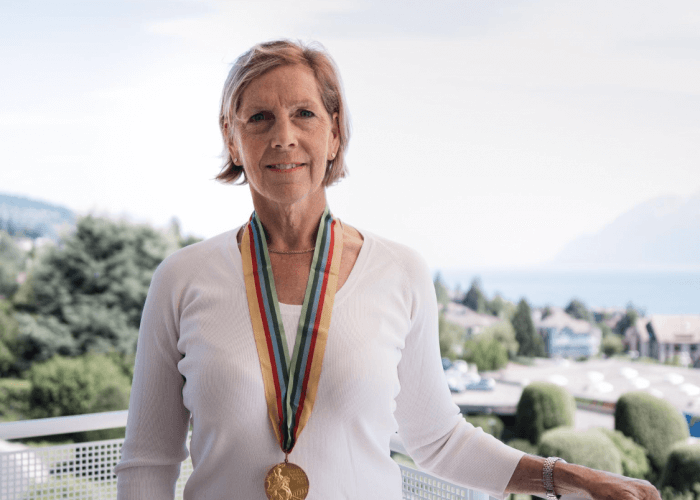
STILL SHINING: Michelle Ford today with her prized possession, the Olympic gold medal from Moscow 40 years ago. Photo Courtesy: Michelle Ford.Photo Courtesy:
And how did she feel when it was over?
“It’s a strange word to say but I think there was relief and amazement to touch that wall in Moscow in first place. If you were a betting man, you wouldn’t have bet on me at all.”
Then finally some positivity out of the haze of hatred, death threats and cheating.
London Olympic bronze medallist from 1948 and then a respected Melbourne-based sports writer with the Sun Pictorial, the late Judy-Joy Davies came up to Ford in the mixed zone after the race.
“She said Michelle ‘you’ve just saved Australia’.
“It didn’t resonate with me right away but 40 years on I understand.
“Montreal (where the swim team won one bronze medal to Steve Holland in the 1500m freestyle) wasn’t a disaster – we just didn’t perform and there were other elements.
“Our last golds were in 1972, so to bring home two golds (mine and the boys in the 4x100m medley relay) for Australia was just massive.
“After the 200 fly, which was the first medal for Australia, when I touched the wall and then stood up on the podium for the bronze medal, it was like Australia reunited and everyone came back together. That’s a bit of the power of sport and what it does to people.
“It’s a bit mystical, if you like, but that’s how it felt. And it was just so fulfilling to have that connection with the Australian flag, and Advance Australia Fair and with all the kids on the ‘80 team, there is a strong affiliation with how important the flag and anthem is.
“People might have seen us as too young and stupid but I don’t think we were. We were focused and determined. I applaud all of the people that made it to Moscow. It was tough.
“I think a lot of us just packed up our swimsuits and put them away and moved on with our lives. You also have to remember that swimming was not going to be a future for us, because we had no money. There was a different motivation.
“When you close the door and move on… you take it all with you… but I guess I didn’t think it was anything extraordinary. Today I realise it is and how extraordinary it was.”




Another great article. Thank you!